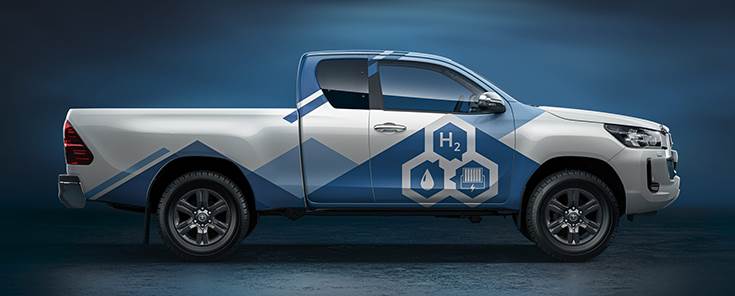Toyota is leading a consortium to develop a prototype hydrogen fuel cell-powered version of its renowned Hilux pick-up at the company’s UK vehicle plant in Burnaston, Derbyshire. Toyota Motor Manufacturing UK (TMUK) has secured UK Government funding for the project through the Advanced Propulsion Centre (APC), an organisation supporting the development of cleaner technologies and new mobility concepts.
The consortium, led by Toyota Motor Manufacturing UK (TMUK) will receive funding to cover the development of a hydrogen fuel cell electric Hilux, working in collaboration with highly skilled UK-based technical engineering partners Ricardo, ETL, D2H and Thatcham Research.
The project will make use of components from Toyota’s second-generation fuel cell system, as featured in the latest Toyota Mirai sedan, to transform a Hilux into an electric vehicle. While TMUK is leading the project, Toyota Motor Europe (TME) R&D will provide technical support to help the UK-based teams to build their expertise and become self-sufficient in developing next generation hydrogen drivetrain technologies.

The APC is a non-profit organisation working with the UK government, the automotive industry and academic bodies to accelerate the industrialisation of technologies to support the transition to net-zero emission vehicles delivery. It plays a key role in the UK’s automotive sector, offering opportunities to bridge the gap between industry and future technological requirements. Its funding specifically covers the later-stage research and development that progresses a product from proof-of-concept to a prototype vehicle.
Within the scope of the funding bid, initial prototype Hilux vehicles will be produced at Burnaston during 2023. Once successful performance results have been secured, the intention is to prepare the vehicle for small series production.
Richard Kenworthy, TMUK Managing Director, said: “The opportunity that this funding enables is significant and goes towards developing the technical capabilities not only of our employees here at our site in Burnaston in the East Midlands but also of those within the wider consortium partners. This region is heavily committed to supporting zero emissions mobility and we see this project as a great opportunity to contribute to the critical path on the road to carbon zero mobility. This UK Government funding will enable teams within the consortium to acquire key skills that can then be used to investigate other fuel cell applications.”
